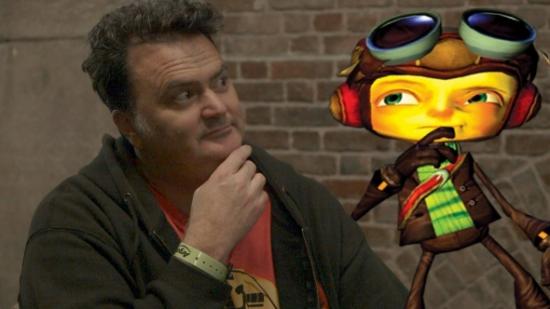BAFTA, the British Academy of Film and Television Arts, recently awarded game industry legend Tim Schafer their coveted Fellowship award. This lifetime achievement award is offered “in recognition of outstanding achievement in the art forms of the moving image,” which is something Schafer has undisputedly offered the world of videogames over the course of his almost 30-year career. At EGX Rezzed 2018 I was able to interview him and discuss his many achievements, his plans for Psychonauts 2, and challenge him to a round of insult swordfighting…
Schafer has worked on some of the best adventure games on PC.
You can watch the interview in the videos embedded in this article. They cement the impression that you likely already have: Tim Schafer is equally delightful and insightful, and our industry is lucky to have him. But I want to discuss why he’s so deserving of the Fellowship award.
Schafer joined LucasArts in 1989, and soon teamed up with Dave Grossman and Ron Gilbert to help create The Secret of Monkey Island, one of PC gaming’s most iconic treasures. Schafer helped craft around two thirds of the game’s dialogue, which remains as sharp and funny today as it was back when it released in 1991. As my first ever PC game, The Secret of Monkey Island has a special place in my heart – I adore its absurd story of useless pirating to this day. But while Schafer’s games at LucasArts may be his most well recognised – a wicked-smart way with wordplay should certainly be valued higher than it currently is – they don’t demonstrate why he’s such a valuable asset to the industry.
Rather than the late 1990s glory days of adventure, you need to look to the turning of the millenium to discover why Schafer is so important. Double Fine, the game studio Schafer set up in 2000, appears to be built on a bedrock of creativity. Since it opened, it has produced a plethora of experiences unlike any other. In the studio’s earliest days, these were spins on very traditional, popular ideas: A 3D platformer, but it’s all set inside the minds of the characters. A hack-and-slash RPG, but it’s also an RTS, and you play as Jack Black and he’s mates with Ozzy Osbourne. As the years have gone on, the studio has let go of its need to keep one hand on the most popular concept of the moment and has fully embraced its own scattershot ideas.
Regardless of budget, and irrespective of whether a game is developed or simply published by the studio, there’s a unifying sense of personality to all of the titles in the Double Fine family. They’re designed with everyone in mind; games that welcome the most diverse crowd of players with open arms. Double Fine was set up years before the great indie boom, but there has always been a sense of that movement to everything they produce: the feeling of a passion project built without regard for financial gain, with the only goal being to delight and inspire people. It’s an attitude that almost saw Double Fine disappear entirely – low sales of Psychonauts and Brutal Legend almost destroyed them – but Schafer’s determination saw them weather the storm.
Shigeru Miyamoto, representative director of Nintendo, was awarded the BAFTA Fellowship award in 2010. While it would be folly to proclaim Schafer as Miyamoto’s equal – he has never created anything as perfectly formed and culturally important as a Super Mario game – he is America’s closest answer to him in one specific way: both Miyamoto and Schafer have an undying enthusiasm for joy. Schafer, like Miyamoto, knows that videogames can be an uplifting experience for everyone. And on his part, whether it’s the witty remarks of Monkey Island or the bouncy energy of Ooblets, Schafer has created and curated a collection of games which, in their simple and unassuming accessibility, represent some of the most important around. That’s an admirable thing to dedicate your life and career to, and that’s why Tim Schafer is so deserving of the BAFTA Fellowship.
